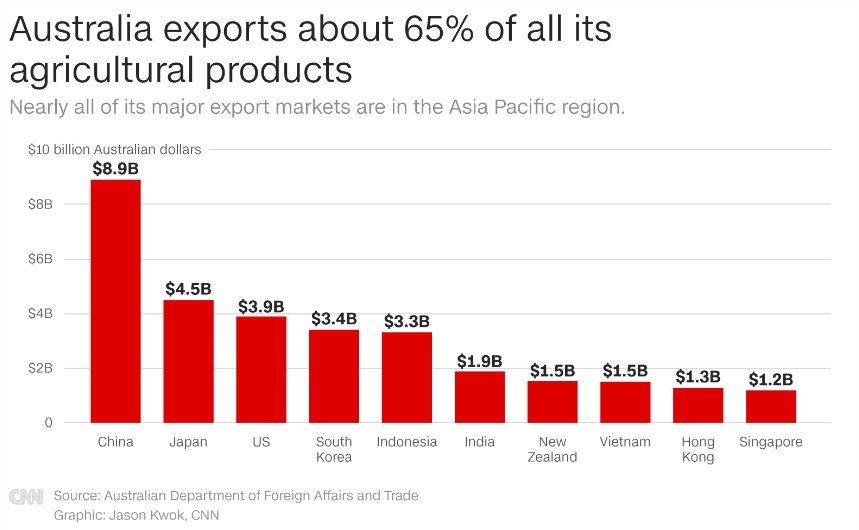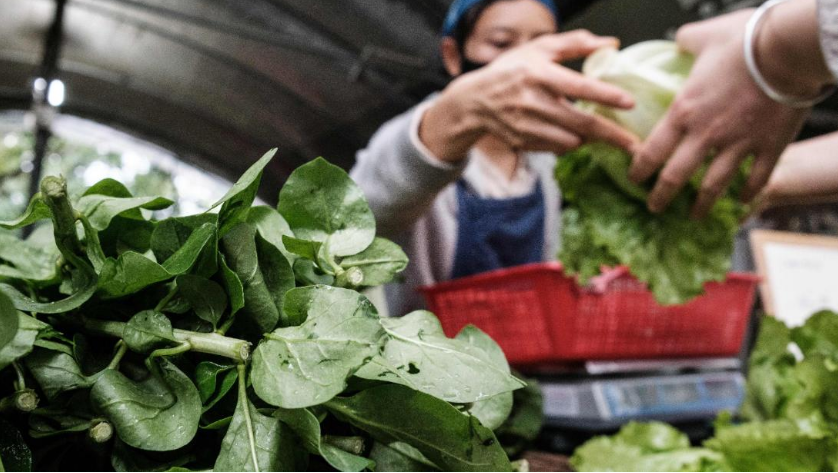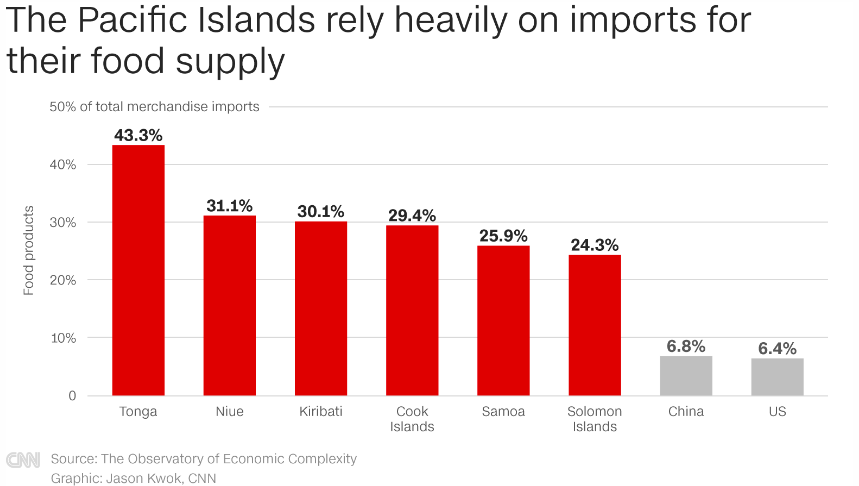
The coronavirus pandemic could threaten global food supply, UN warns
联合国警告说,新冠病毒大流行可能威胁全球粮食供应
音频收听:新冠危机或引发全球粮食危机
Hong Kong (CNN)As the novel coronavirus pandemic shuts down businesses globally and sends countries into lockdown, the disruptions are threatening to cut off supply chains and increase food insecurity.
香港(CNN)新型冠状病毒的流行导致全球范围内的企业关闭并使国家进入封锁状态,这种中断有可能切断供应链,加剧粮食不安全。
"Supermarket shelves remain stocked for now," the Food and Agriculture Organization of the United Nations (FAO) said in a report released late last month. "But a protracted pandemic crisis could quickly put a strain on the food supply chains, a complex web of interactions involving farmers, agricultural inputs, processing plants, shipping, retailers and more."
联合国粮农组织(FAO)在上月底发布的一份报告中表示:“超市货架上目前仍有存货。”“但一场旷日持久的流行病危机可能很快给食品供应链带来压力,这是一个涉及农民、农业投入、加工厂、航运、零售商等的复杂联系网络。”
The issue, however, is not food scarcity - at least, not yet. Rather, it's the world's drastic measures in response to the virus.
然而,问题不是粮食短缺 -至少现在还不是。相反,这是全球应对病毒的激烈措施。
Border closures, movement restrictions, and disruptions in the shipping and aviation industries have made it harder to continue food production and transport goods internationally -- placing countries with few alternative food sources at high risk.
边境关闭、行动限制以及航运和航空业的中断,使粮食生产和货物国际运输变得更加困难,使几乎没有其他粮食来源的国家面临高风险。
Airlines have grounded thousands of planes and ports have closed - stranding containers of food, medicine, and other products on tarmacs and holding areas, said the UN Conference on Trade and Development on March 25.
联合国贸易和发展会议于3月25日表示,航空公司停飞了数千架飞机,港口关闭,将装有食品、药品和其他产品的集装箱搁置在停机坪和等候区。
Heightened instability in global food supply will affect the poorest citizens most, warned the UN's Committee on World Food Security (CFS) in a paper last month.
联合国世界粮食安全委员会(CFS)在上个月的一份报告中警告说,全球粮食供应不稳定的加剧将对最贫困的民众产生最大的影响。
Even private companies and organizations have called for immediate action to address the looming food catastrophe.
就连私营企业和组织也呼吁立即采取行动,应对迫在眉睫的粮食灾难。
"Governments, businesses, civil society and international agencies need to take urgent, coordinated action to prevent the COVID pandemic turning into a global food and humanitarian crisis," said an open letter to world leaders from scientists, politicians, and companies like Nestle and Unilever.
“各国政府、企业、民间团体和国际机构需要采取紧急的、协调的行动,以防止冠状病毒大流行演变成全球粮食和人道主义危机,”一封来自科学家、政治家、以及雀巢和联合利华等公司领导人的公开信说。
China's technological advances softened the blow
中国的技术进步减轻了这种打击
China was worst-hit by the virus in January and February, when thousands of new cases were being reported each day.
中国在1月和2月是受该病毒影响最严重的两个月,当时每天都有数以千计的新病例报告。
The country imposed lockdowns, suspended inter-provincial trave and ordered residents to stay at home, disrupting business in virtually all sectors.
中国实施了封锁,暂停跨省旅游,并下令居民呆在家里,几乎所有行业的业务都受到了影响。
"In China, logistics constraints and labor crunches have caused losses of fresh vegetables, limited access to animal feed and diminished capacity of slaughterhouses," said the FAO report.
粮农组织的报告说:“在中国,物流限制和劳动力短缺造成了新鲜蔬菜的损失,动物饲料的供应有限,屠宰能力下降。”
China has faced severe food shortages before; historians estimate tens of millions of people starved to death in a famine caused by an economic campaign known as the Great Leap Forward, from 1958 to 1962.
中国以前曾面临严重的粮食短缺;历史学家称,从1958年到1962年,“大跃进”运动和三年自然灾害曾引发灾荒。
But modern China is an entirely different country, with new technologies and wealth -- and it has been working for years to improve its food security, spending tens of billions of dollars this past decade purchasing major seed businesses.
但现代中国是一个完全不同的国家,拥有新技术和新财富 -多年来,中国一直在努力改善食品安全,在过去10年斥资数百亿美元收购主要种子企业。
These efforts appear to have softened the blow to the food industry this time around. The central government distributed $20 million in subsidies to revive agriculture, and invested in technology including agricultural drones and unmanned vehicles that could keep supply chains moving without human contact, said the FAO report.
这些努力似乎缓解了这一次对食品行业的打击。粮农组织的报告说,中央政府发放了2000万美元的农业补贴,并投资于农业无人机和无人驾驶汽车等技术,这些技术可以在没有人接触的情况下保持供应链的运转。
When people did go into the fields to work, they wore government-provided masks and protective equipment, and were given disinfectant from local authorities, said state-run news agency Xinhua.
据官方媒体新华社报道,当人们到田里工作时,他们戴着政府提供的口罩和防护设备,并从当地政府获得消毒剂。
Even the country's dominant e-commerce market stepped in; provincial lockdowns and movement restrictions hampered the export and transport of goods, so e-commerce giant Alibaba set up a fund to help farmers find markets for their unsold products, the report said.
甚至中国占主导地位的电子商务市场也介入了;报道称,省一级限令和行动限制阻碍了商品的出口和运输,因此电商巨头阿里巴巴设立了一项基金,帮助农民为未售出的商品找到市场。
Australia is facing export pressure
澳大利亚正面临出口压力
Australia exports about two thirds of its agricultural products and is a major supplier for the Asia Pacific region - but this crucial trade is now under threat.
澳大利亚有大约三分之二的农产品出口,是亚太地区的主要供应国,但是这一重要的贸易现在受到了威胁。
The aviation industry has been hit hard by the pandemic and international flights have been slashed. Fewer flights mean it's now more expensive to export food via air travel, said Richard Shannon, manager of policy and advocacy at Growcom, the representative body for horticulture in Queensland state.
航空业受到病毒大流行的严重打击,国际航班也大幅减少。昆士兰州园艺代表机构Growcom的政策和宣传经理理查德·香农说,航班减少意味着现在通过航空运输出口食品的成本更高了。
"The industry is rapidly trying to find alternate routes," he said - but some Australian farmers may try to find new buyers within the country instead of looking internationally.
“这个行业正在迅速寻找替代路线,”他说,但一些澳大利亚农民可能会试图在国内寻找新的买家,而不是放眼国际市场。
This threatens the entire country's economy in two ways. About 14.5% of all Australian exports are food products, according to the Observatory of Economic Complexity (OEC). If farmers aren't able to export their goods, it could cost the country tens of billions of dollars in lost income.
这从两个方面威胁到整个国家的经济。根据经济复杂性观察组织(OEC)的数据,澳大利亚大约14.5%的出口是食品。如果农民不能出口他们的产品,可能会给国家造成数百亿美元的收入损失。

The next best option is for farmers to sell their goods within Australia - so all these agricultural products that typically are sent out into the world are suddenly entering the domestic market. This influx could put a lot of pressure on the market, and affect the price at which these goods are sold, Shannon said.
下一个最好的选择是让农民在澳大利亚国内销售他们的产品,因此,所有这些通常出口到世界各地的农产品突然都进入了国内市场。香农说,这种流入可能会给市场带来很大压力,并影响这些商品的售价。
The government stepped in with emergency aid, announcing it would spend 110 million Australian dollars ($67.4 million) to increase the number of flights and help exporters transport their goods to key international markets.
政府也提供了紧急援助,宣布将投入1.1亿澳元(约合6,740万美元)增加航班数量,帮助出口商将货物运输到重点国际市场。
But the pandemic has also posed other problems. Winter is arriving in Australia - which means seasonal workers nationwide are flocking to Queensland, which grows more than 90% of the country's winter vegetables. Suddenly, small rural towns are booming with people arriving from out of state, looking for work on farms.
但冠状病毒大流行也带来了其他问题。澳大利亚的冬季即将来临,这意味着全国的季节性工人都涌向昆士兰,那里种植着澳大利亚90%以上的冬季蔬菜。突然之间,随着许多人来到这里,寻找在农场工作的机会,乡村小镇蓬勃发展。

With such a high volume of people living and working in close quarters, just a handful of infections could spell disaster for farm operations - but these farms can't just shut down for 14 days, the way businesses in other sectors might.
由于如此大量的人在狭小的空间里生活和工作,仅仅几例感染就可能给农场经营带来灾难,但这些农场不可能像其他行业那样关闭14天。
"We're an essential service," Shannon said. "People need to continue eating."
“我们是一项必不可少的服务,”香农说。“人们需要继续吃饭。”
Queensland authorities and growers are now working to create protocol that can both keep workers safe and prevent farm shutdowns, like staggering lunch shifts to reduce the number of people in close contact.
昆士兰当局和种植商正在努力制定既能保证工人安全又能防止农场关闭的规程,比如错开午餐时间以减少密切接触的人数。
Hong Kong and Singapore can buy their way out
香港和新加坡可以通过购买来摆脱困境
Hong Kong and Singapore are two of Asia's major financial hubs - but with limited farmland, they both have tiny agricultural sectors and import more than 90% of their food, according to government websites.
香港和新加坡是亚洲的两个主要金融中心,但根据政府网站的数据,由于耕地有限,这两个地方的农业部门都很小,90%以上的食品依赖进口。
Despite this, they are in little danger of food shortages, experts say. For starters, they both have a main supplier; Hong Kong imports the vast majority of its food from mainland China, and Singapore imports from Malaysia. As long as these major sources stay steady, food staples will be secure, and halted imports from other countries won't make too big an impact.
专家说,尽管如此,他们几乎不存在粮食短缺的危险。首先,它们都有一个主要的供应商;香港绝大多数食品来自中国内地,新加坡主要从马来西亚进口。只要这些主要来源保持稳定,主食就会得到保障,停止从其他国家进口不会造成太大影响。

Even when China was in the depths of its coronavirus crisis, food still flowed across the border into Hong Kong, said Jonathan Wong, director of the Institute of Bioresource and Agriculture at Hong Kong Baptist University.
香港浸会大学生物资源与农业研究所所长黄焕忠说,即使在中国处于冠状病毒危机最严重的时期,食品仍源源不断地进入香港。
Some niche products like oysters from France may be cut off for a while - but these aren't daily necessities, and Hong Kong can replace the supply through other countries, said Wong.
一些利基产品,如来自法国的牡蛎可能会暂时停止销售,但这些并不是生活必需品,香港可以通过其他国家来取代这些供应,黄说。
And although Malaysia is currently under a nationwide lockdown, the food industry is one of the essential services exempt.
尽管马来西亚目前处于全国封锁状态,但食品行业是基本服务行业之一。
"Our supply chains are intact and there has been no disruption to Singapore's imports," said the Singapore government in a statement after Malaysia announced the lockdown.
“我们的供应链完好无损,新加坡的进口没有受到影响,”马来西亚宣布禁售后,新加坡政府在一份声明中表示。
Even if there was any kind of disruption, Singapore has two months' worth of produce stockpiled, and has diversified its sources so it isn't wholly reliant on Malaysia, said Singapore Trade and Industry Minister Chan Chun Sing on Facebook.
新加坡贸易和工业部部长陈振声在Facebook上说,即使出现任何中断,新加坡也有相当于两个月的农产品库存,而且来源多样化,因此不完全依赖马来西亚。
The Pacific Islands are at highest risk
太平洋岛屿的风险最高
The crucial thing that sets places Singapore and Hong Kong apart is that they have the resources to buy their food from alternate sources if any supply lines are compromised. But that isn't true for import-reliant, low-income countries like the Pacific Islands.
将新加坡和香港区别开来的关键一点是,如果有任何供应线受损,它们有资源从其他地方购买食物。但对于依赖进口的低收入国家,如太平洋岛国,情况并非如此。
"The most at risk are those without solid economic bases, like Kiribati or Micronesia or Tuvalu," said David Dawe, FAO senior economist.
粮农组织高级经济学家戴维·达韦说:“最危险的是那些没有坚实经济基础的国家,如基里巴斯、密克罗尼西亚或图瓦卢。”
Some developing countries such as Laos or Myanmar produce enough staples including rice that they can survive an import drain - but these Pacific Islands are so small that they don't grow much of their own food, said Dawe. They are "remote anyway to start with and rely heavily on imports."
达韦说,一些发展中国家,如老挝和缅甸,自己可以生产足够的主食,包括大米,它们可以在没有进口的情况下生存,但这些太平洋岛屿太小,它们自己种植的粮食不多。它们“一开始就严重依赖进口”。

These islands typically rely on tourism for much of their income - but nobody is traveling in the midst of a global pandemic. The loss of tourism revenue, the lack of domestic food production, and the lack of a financial or food safety net mean these countries are "really getting hit from both sides," said Dawe.
这些岛屿的大部分收入通常依赖旅游业,但没有人在全球病毒大流行期间旅行。达韦说,旅游收入的损失、国内食品生产的缺乏以及缺乏金融或食品安全网络,意味着这些国家“确实受到了两方面的打击”。
Food shortages and price hikes could lead to severe food insecurity for already vulnerable populations.
食品短缺和价格上涨可能导致本已脆弱的人群面临严重的食品不安全。
"For some people, it might literally mean no food on the table," Dawe said. "It might mean trying to borrow money from people at high interest rates. It may mean having to go all the way back to your village, where in some cases you have to walk if public transport is shut down, to ride it out together with your family."
“对一些人来说,这可能意味着餐桌上没有食物,” 达韦说。“这也可能意味着借高利贷,甚至意味着你必须回到你的村庄,在某些情况下,如果公共交通关闭,你只能步行,和你的家人一起度过难关。”
What the world needs to do
世界需要做什么
The UN is now urging affected countries to implement emergency measures domestically, as well as work together on a global level to protect food supply.
联合国目前敦促受影响国家在国内实施紧急措施,并在全球范围内共同努力保护粮食供应。
Governments can protect their citizens by mobilizing food banks, offering cash transfers to vulnerable households, establishing emergency food reserves, and taking steps to protect agricultural workers, said the FAO.
联合国粮农组织说,各国政府可以通过动员粮食银行、向弱势家庭提供现金援助、建立紧急粮食储备以及采取措施保护农业工人来保护本国公民。
International cooperation and open global trade is also key; governments should eliminate export restrictions and import tariffs during this time, said the report. Poorer countries who can't afford stimulus packages and agricultural bailouts should seek international funding.
国际合作和开放的全球贸易也是关键;报告称,各国政府应在此期间取消出口限制和进口关税。负担不起经济刺激计划和农业援助的贫穷国家应该寻求国际资金。
"The world was awfully unprepared for the pandemic," said the FAO report.
粮农组织的报告说:“全世界对这场大流行毫无准备。”
"But by keeping the gears of the supply chains moving and actively seeking international cooperation to keep trade open, countries can prevent food shortages and protect the most vulnerable populations."
“但通过保持供应链的运转,并积极寻求国际合作以保持贸易开放,各国可以防止粮食短缺,保护最脆弱的人口。”
原文链接:
https://edition.cnn.com/2020/04/10/asia/coronavirus-food-supply-asia-intl-hnk/index.html
(责任编辑:张钧洋)
(版权说明,转载自:科学猫科普公众号)

